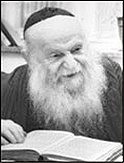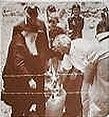Rabbi Zvi Yehuda Kook (Part 1)
In lectures 7-8, we discussed the Zionist turnaround of Rabbi Teichtal. In this shiur, we will be looking at the Holocaust through the eyes of Rabbi Zvi Yehuda Kook, whose ideology shares much in common with that of Rabbi Teichtal, although – as we shall see – their ideologies are drawn from different sources and have different motivations.
A. Biography
Rabbi Zvi Yehuda Kook was the son of Rabbi Avraham Yitzchak ha-Kohen Kook. He was born in the town of Zaumel, in the Kovno district of Lithuania, on the seder night (15th Nissan) in the year 5651 (1891). He passed away on Purim 5742 (1982), after a long illness.

Soon after his bar-mitzva, Rabbi Zvi Yehuda Kook moved to Eretz Yisrael together with his family. He studied at the Torat Chaim yeshiva in Jerusalem, and he continued his Torah studies under the tutelage of his father after leaving the yeshiva. He spent the period leading up to WWI in Halberstadt (Germany), where he studied philosophy at the university. When his father, visiting Europe to encourage aliya, found himself unable to return to Eretz Yisrael owing to the outbreak of war, Rabbi Zvi Yehuda joined him for a while in Switzerland, where they engaged in intensive study.

Rabbi Zvi Yehuda devoted many years to the study, compilation, and editing of his father's writings. Following the passing of Rabbi Charlap, he assumed the position of Rosh Yeshiva of Yeshivat Merkaz Ha-Rav in Jerusalem, the yeshiva his father had founded. Under his leadership, the yeshiva became a vibrant center that drew growing numbers of religious youth, particularly from the Bnei Akiva youth movement.
Rabbi Zvi Yehuda Kook urged his students to involve themselves in the practical needs of the State. Inter alia, the Merkaz Ha-Rav yeshiva produced the leaders of the Gush Emunim movement, for whom Rav Zvi Yehuda served as spiritual mentor. He also supported the activities of the El Ami movement, which worked to bring Russian Jews to Israel, and his students were among its main activists. It may fairly be asserted that a considerable number of Zionist "yeshivot gevohot," most of the "hesder" yeshivot, and even the pre-military academies can be attributed to the vision and work of Rabbi Zvi Yehuda Kook and his students.[1]
B. Asking the Holocaust question
There is no systematic work by Rav Zvi Yehuda Kook on the subject of the Holocaust. He mentions his views on the subject in some of his "sichot," and they are consistent and mutually complementary. Here we cite one of his sichot as recorded in "Sichot Ha-Rav Zvi Yehuda:"[2]
1.Bewilderment
"We should not raise questions and complaints against the Master of the universe. On Yom Kippur we recite the vidui (confession) service, which is arranged alphabetically, and includes sins that man commits against God as well as those that he commits against his fellow man. The last item that we mention is, "For those sins which we have sinned before You through bewilderment (timhon levav)." The Maharil Diskin asked, What sort of sin is bewilderment? Is there then some negative commandment, some prohibition, against wonderment and bewilderment? He answers that this sin of bewilderment is the most severe sin of all, the ultimate sin: to wonder at God. Sometimes there are situations in a person's life where we do not understand what God is doing, and then one comes with questions and complaints against the Master of the universe. Criticism of God is the greatest sin, arising from lack of faith in Divine Providence. Questions about the Holocaust fall into the category of complaints against God.
2.God's calculations
Everything is God's secret. The entire order of Divine Providence is concealed from us. To ask all kinds of questions about the Holocaust is childish; only with great caution and with spiritual maturity can this fearsome subject be approached. First, it must be remembered that there is a difference between Divine accounts and human accounts. A genuine religious philosophy and genuine faith include also an understanding of the "years of each generation:" "Remember the days of the world; understand the years of each generation" (Devarim 32:7). [This means] an understanding of God's revelation in the world in all areas: God's revelation in nature, and – no less so – God's revelation in history, in the "years of each generation," and the faith in Divine Providence and Divine accounting. But at the same time, it must also be remembered that "Your thoughts are not My thoughts, and My way is not your way, says God… so are My ways higher than your ways, and My thoughts [higher] than your thoughts" (Yishayahu 55:8-9). A weakness in faith and in one's world-view leads one to measure Divine Providence by the yardstick of our understanding, which is limited and cannot comprehend the conduct of "the Kingdom of all worlds." Our accounting is a human accounting, an accounting of the here-and-now, whereas the Divine accounting is an accounting of [all] generations. There are great and terrible matters that involve the entire world; we are incapable of understanding them and questioning them. Sometimes, a person forgets that our question is not dependent on the degree to which we are able to elevate ourselves and to address the overall Divine accounting. It is not so easy to elevate oneself to such a degree. Therefore, there have been those who were led to a loss of faith in the wake of the Holocaust, since they were not able to elevate themselves to true knowledge of God. Obviously, we must show understanding towards them, as our Sages taught concerning Iyov: "A person is not to be judged in his sorrow" (Bava Batra 16b). There is room to show understanding for a person concerning the improper actions that he performed at a time of distress, although we do not justify them.
At first glance, Rabbi Zvi Yehuda's position seems like an outright rejection of any theological discussion of the Holocaust. One should not try to question the Holocaust; if someone questions God in the wake of the Holocaust, then although we must show him understanding in view of his pain, he is committing the transgression of "timhon levav" (bewilderment, questioning of God).
What alternative does Rabbi Zvi Yehuda propose? Seemingly, in the absence of questions or attempts to understand, we are left with nothing but simple faith, the knowledge that God's thoughts are beyond our comprehension, and that God's management of the world reflects His own testimony – "But My face shall not be seen" (Shemot 33:23).
Actually, this is not the position that Rabbi Kook seeks to present. His true intention is hinted to in the words, "Only with great caution and spiritual maturity can this fearsome subject be approached." In other words, the negation of theological questioning concerning the Holocaust is only limited and partial. What Rabbi Zvi Yehuda means is that the beginning of any contemplation of the Holocaust – or, for that matter, of other issues pertaining to God's Providence and His management of the world – from a regular, human point of view, is problematic. We are not required to suspend thought and questioning altogether; what we must do is to elevate it. Further on in the sicha, as we shall see, Rabbi Zvi Yehuda himself proposes a very well-defined explanation for the Holocaust. What we need to understand at this stage, then, is the inherent deficiency of the human perspective from which it is forbidden to approach the Holocaust, and the desired perspective from which one may try to understand Divine Providence.
It appears that Rabbi Kook negates discussion of the Holocaust in the context of Divine justice with respect to individuals. People usually formulate their questions as, "Why is this happening to me?" or, "What have I done to deserve such a punishment?" Such questions belong to the human accounting of the present; they do not consider or seek the Divine guidance of events that transcends the present and the individual. God's governance moves and guides all of history; it is from this perspective that we should try to explain events.
Questioning God in the context of the concept of reward and punishment means assuming that God acts only in the interests of individual human happiness and justice – after all, this what the concept is all about. However, this is a rather limiting perspective, and it therefore leads to questions that have no answers, to timhon levav. Hence, we may say that the manner or the context in which the question is posed determines the possible horizons of the answer:
When a person is told that he cannot understand God's conduct in all of its greatness and wisdom and truth, he feels put down and oppressed. It is difficult for a person to accept a negative approach, and it is hard for him to deal with the idea that "Your thoughts are not My thoughts." [But] this understanding that "Your thoughts are not My thoughts" need not flow from rejection; on the contrary, it is possible to acknowledge out of great uplifting that all of man's affairs and his reality belong to a world which is limited, but are connected to a world which is without limit, the "Kingdom of all worlds," the "reign over all generations." When our limited thoughts encounter the Divine accounting, we arrive at the knowledge that, although we exist within a certain, defined situation, we also belong to a superior, all-encompassing reality, and this thoughts uplifts us.
The same is true when we contemplate the Holocaust from within attachment to the Divine accounting. We are then liberated from the oppressive, depressed feeling. Out of attachment to supernal Divine cleaving and elevation to the all-encompassing Divine manifestation, light is cast even over the most terrible and frightful things. The Holy One, blessed be He, is not bound to our limited thoughts; on the contrary, our thoughts belong to the accounting of heaven and earth and each and every generation. The Divine accounting is not limited to just one out of all the generations; rather, it is an accounting for "each and every generation."
Only from within such an approach is there a possibility of "God answered Iyov from the tempest" (Iyov 38:1) – an uplifting to the highest spiritual states of attachment to the Creator of the world. Only then does it "restore the soul." It is true that man tends to understand Divine conduct in a small-minded way, but then difficulties arise in our understanding. We are commanded to elevate ourselves to an understanding that is expansive, "Understanding the years of each generation;" to elevate ourselves beyond the small-minded explanations, beyond the petty questions. We must be cautious and not think in a limited, small-minded way about sorting out the historical accounts of the Jewish people; rather, we must achieve an elevation of our thoughts to accountings of all the worlds. Only thus is there room to consider God's great works. "God's Torah is perfect" (Tehillim 19:8) – and then it "restores the soul" (ibid.). When the Torah is perceived in its wholeness, it restores the soul. Likewise, when the matter of the Jewish people is perceived in its completeness, only then does it restore the soul.
In the next section of this shiur, we shall see what he means by this.
Translated by Kaeren Fish
[1]For further reading, see Rav Shlomo Aviner: "Zvi Kodesh: Toldot Rabbeinu Ha-Rav Zvi Yehuda Ha-Kohen Kook," Beit El, 5765.
[2]Rav Shlomo Aviner (ed.), sicha 1, 5727, pp. 7-13.
, full_html, In lectures 7-8, we discussed the Zionist turnaround of Rabbi Teichtal. In this shiur, we will be looking at the Holocaust through the eyes of Rabbi Zvi Yehuda Kook.


This website is constantly being improved. We would appreciate hearing from you. Questions and comments on the classes are welcome, as is help in tagging, categorizing, and creating brief summaries of the classes. Thank you for being part of the Torat Har Etzion community!